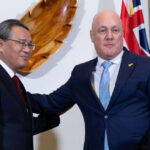According to Mr. Shi, the relationship among Japan, the United States, and South Korea forms a triangle, with the weakest side being the Japan-South Korea relation. Guo has pointed out that in recent decades, the United States and China had a strong unspoken agreement. However, the only area of uncertainty lies in Taiwan. The establishment of diplomatic relations between the U.S. and China was based on the understanding that China would not attack Taiwan. Despite initial claims of pursuing peaceful reunification with Taiwan, China later set a reunification timeline of ten to 15 years, including the possibility of using military force.
This push for reunification serves as a means of internal legitimacy for Xi Jinping, who views it as a symbol of China’s ascension. This shift in China’s stance towards Taiwan has led to a significant change in the U.S.’ strategic outlook on China, leading to deteriorating bilateral relations. The enactment of the Taiwan Travel Act and Taiwan Assurance Act by the U.S. further strained relations between the two countries.
The dynamics of the U.S.-Japan-South Korea triangle have also evolved, with Japan-South Korea relations experiencing improvement under pressure from external forces. However, tensions between Japan and South Korea benefit the CCP the most, as it weakens the U.S.-Japan-South Korea alliance, which poses a security challenge to China. The fluctuation in Japan-Korea relations can be attributed to historical issues, territorial disputes, trade frictions, and domestic political factors.
In terms of Sino-Japanese relations, the CCP’s use of nationalism has contributed to the deterioration of ties between the two countries. China’s designation of Japan as a primary enemy has fueled anti-Japanese sentiments and hindered efforts to improve relations. This approach has led Japanese elites to strengthen themselves through initiatives like the Indo-Pacific strategy, proposed by Shinzo Abe.
Overall, the evolving dynamics in East Asia highlight the complex interplay between geopolitical interests, historical animosities, and domestic politics. The views expressed in this article reflect the opinions of the author and may not necessarily align with those of The Epoch Times. Please revise
Source link





